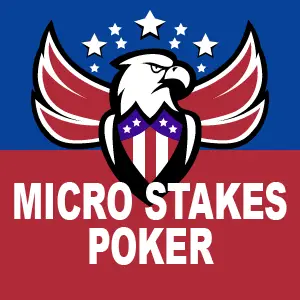Fast Track To Success – Lesson 11

Micro Stakes Poker (11)
- Players will generally play too weakly out of position
- Your mission is to punish them for it
- Some micro stakes players will play differently, but they are easy to beat as well
The More Transparent Players Are, The Easier They Are To Beat
When we looked at the potential pitfalls of being out of position, the first thing we looked at is the problems of players telegraphing their hands too much. So while we certainly are going to be looking to avoid doing that ourselves, often times our opponents won’t be so careful to hide things, especially at the micro stakes. This does make them very easy to play against.
If they only bet when they have a good hand, we can play on when we have a better hand than the range they are betting, and otherwise fold without contributing any more money to the pot. If they check when they don’t have much, then we can bet out a lot and have them fold and win the pot without needing a hand ourselves. So we’re pretty much going to abuse these players, and it doesn’t really require much skill at all to do so, only a willingness to pay attention and a desire to take advantage of things.
Some Players Don’t Really Get The Way This Is Supposed To Work

Sometimes you will run into players who merely by way of their ignorance of position will play pretty aggressively out of position. These players often will play more correctly in a sense than their weaker counterparts who do know enough about the game to respect position at least somewhat. While we ourselves are looking to be aggressive out of position at times, the key phrase here is at times, in other words, when it’s to our advantage to do so. This player doesn’t really care who he’s doing it against and rarely even pays attention to who he’s doing it with.
So this does tend to work against a fair number of micro stakes opponents who don’t really know how to deal with it other than playing back when they do have a hand, and folding too much of the time otherwise. These overly aggressive out of position players tend to push their hands too far though, and that’s something that we’re going to make them pay with.
Their other opponents often will get pushed off their hands later without showing them down, which is in fact the worst thing you could possibly do against this type of player, as folding right away is far preferable to doing it later prior to showdown, as you just make his play more profitable. This is something that it pays us to pay attention to as well, to use it against players who will chase too many hands and fold before showdown. They are a great source of money for us.
Thinking Things Through More Than They Do Is The Key Here
A very important part of being successful at poker is to always have a plan, and when we do look to play back against these bets, it’s never going to be with the idea to just see another card because you think a player may be bluffing. This is one of the things that kills weaker players, and while there will be cases where you’re going after draws and end up folding because you didn’t hit, you need to limit these cases to situations where you actually have the proper odds, and not take all sorts of liberties by chasing too many hands this way.
Of the major ways we put ourselves in a position to lose money at the poker table, putting extra money in pots where we shouldn’t and then abandoning it later is a real big one. This is in fact one of the ways that players lose more out of position, particularly with the habit of bet folding. You bet, I raise you, and then you fold. So this is something we need to be careful of in general, but it’s much worse to put in several bets and then fold. Geez, I don’t think he has much, so I’ll call another of his bets and see what he does on the next street. Wow, he bet again, this is getting too expensive for me now, maybe he does have it, I better fold. That’s an extremely bad way to play.
Think Through Your Moves In The Hand
So this is one of the reasons why you need a plan, not just some of the time but all of the time. All online poker software provides you with a period of time to think, and think you must do. So if I call here and he bets again, what am I going to do then? The time to think about this is before you make the call, not on the next street. Of course we also want to look at a players’ general tendencies as well as any other information we can pick up from how the hand has played out so far and use that information in our decisions as well.
You will find though that a fair number of players, particularly better ones, will check to you more often than not out of position. So if they are doing this every time, then they aren’t giving us any information, but what they are giving us is the opportunity to get free cards. Of course we’re going to be testing them with bets to see how often they fold to them, in addition to watching how they play when other players bet into then, which is a reminder that you need to be paying attention just as closely when you are not in a hand as when you are in one. This is another reason why playing one table at a time is best starting out, and in my opinion, is best period.
So if a player does fold too much to our bets but is willing to lead out the turn when we check back, this is another opportunity for us. So what I would look to do here is to bet the lower end of my range, and check back the real hands, and either call his bet on the turn with them or raise him right now, depending on what he likes to do on the river. So this is definitely an example of what you could call using position to your advantage, although as you can see from the previous lesson, you can exploit people regardless of your position, although you definitely want to pay attention to it.
Don’t be Too Afraid Of Their Aggression
One of the real fears of playing out of position that players have, and one that I hear all the time even from players considered to be very good, is that they tend to be afraid of abandoning pots due to aggression from their opponents. Now they know that in position players tend to be more aggressive in general, at least at the stakes up from the micro ones, so this really shouldn’t matter, and in fact it can be a good thing. If I know a player will shove on me a lot, that really is music to my ears, as I will then set him up to take his stack more often than not.
We want to be aggressive in every situation though as a general rule, and definitely in position, but we want to be aware of the problems of being too aggressive. Aggression in itself is almost always good, very good in fact. The problem that we run into is not adjusting our aggression to changing circumstances as the hand develops and the price of our bets rises. For instance, if you knew that I bet a lot in position, and continued on with the bets all the way to showdown, you could just call me with your good hands and smack me all over the table.
So if I am going to be firing second and third barrels without a good hand, and thus am going for fold equity, I better damn well have it, or I am going to be spewing money. This can get me in trouble both in and out of position, but it’s a particular danger in position as we will tend to correctly be more aggressive generally in position, but we definitely don’t want to overdo it.
You Need To Think About Your Bluffing Strategy
Some players think it’s weak to only fire one barrel as a bluff, but it’s only weak if it’s stupid, and it’s very often stupid to fire several. You need to fold enough every time that I look to go for fold equity, and worrying about meta considerations such as players knowing that you bluff the flop a lot if you don’t continue that often later isn’t something that you want to make up for by firing out when it doesn’t make sense to.
If they think you bet too much on the flop and show that they are willing to get it in more often, then it’s time to bet less and make them pay for that as well. So there’s really only one way to deal with people’s perceptions of you, and that’s to be aware of them and to adjust.
This might seem to be a bit much for newer and less experienced players to be thinking about, but it’s never too soon to start thinking about these things, and for now what I want you to do is not worry about certain moves that you think might be too easy for your opponents to figure out. At this level they very often won’t, and if they do, you just change things up to take advantage of this new tendency instead.
You Don’t Have To Be An Expert To Crush The Micro Stakes
Good poker, even excellent poker, isn’t as difficult as a lot of people think, and it really comes down to playing better than your opponents play. At the micro stakes level, players really do play very badly, and in spite of their playing much better overall than they did years ago when online poker was newer, they still play very bad and are just as easy to beat the crap out of. By playing tighter generally, they may not lose it as fast to us, but they will lose it as surely, perhaps even more surely in fact.
So our default against tight players, and the tightness in general that you see a lot more of these days even at the micro stakes, is to take advantage of this extra folding by being more aggressive, without committing several bets to hands which don’t warrant it. When in position, given that players tend to play weaker out of position, this aggression will be even more of a weapon for us. Make sure you are always paying attention though and thinking things through as best you can and you will generally have the best of it to show for it.
Micro Stakes Poker – Fast Track to Success
- Fast Track To Success – Lesson 1
- Fast Track To Success – Lesson 2
- Fast Track To Success – Lesson 3
- Fast Track To Success – Lesson 4
- Fast Track To Success – Lesson 5
- Fast Track To Success – Lesson 6
- Fast Track To Success – Lesson 7
- Fast Track To Success – Lesson 8
- Fast Track To Success – Lesson 9
- Fast Track To Success – Lesson 10
- Fast Track To Success – Lesson 11
- Fast Track To Success – Lesson 12